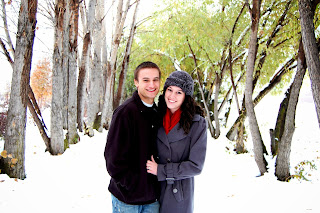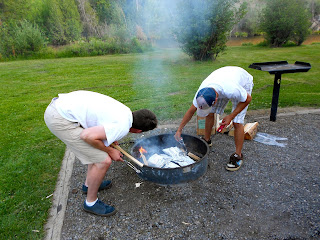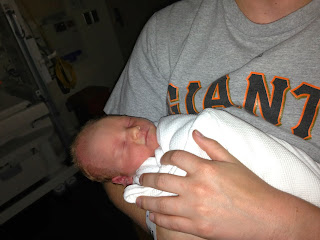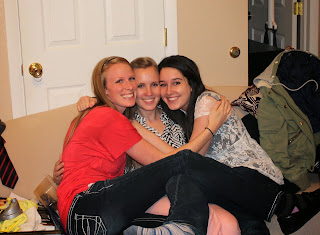I apologize for those of you who already heard this.
I also apologize for all the grammatical errors, this was meant to be given orally--I didn't really plan to type it all up perfectly. I also resisted the urge to add proper citations and a works cited, because I know its a blog and you don't care.
I will post Garth's talk as soon as he types it up. Its just mainly for our records--but feel free to read [:
For
those who know me, you know that I love Christmas maybe a little more than the
average person. I’m that annoying neighbor who has her holiday wreath up the
day after Halloween and Christmas music begins playing way before Thanksgiving (which I realize is a big no no for some),
especially if its already begun to snow outside. My husband has tried, and
failed, to stall me on my premature decorations and holiday excitement, but I
simply love the holidays too much!
So
as I was preparing my talk I began to think about what makes Christmas so special
for all of us. Of course there is the music, the decorations, Santa, and the
inevitable time with family. However, I believe what really draws us all in is
the dominant presence the spirit of Christ has during this season. I believe we
all, religious or not, become a little more Christ-like when the Holidays come
around—that’s the real magic of the season. Its not just in the giving of gifts, but
also in our thoughts we begin to look outward beyond ourselves and see the
needs of others.
President Monson said in the annual
Christmas Devotional, “Our celebration of Christmas should be a reflection of the
love and selflessness taught by the Savior. Giving, not getting, brings to full
bloom the Christmas spirit. We feel more kindly one to another. We reach out in
love to help those less fortunate. Our hearts are softened. Enemies are
forgiven, friends remembered, and God obeyed. The spirit of Christmas
illuminates the picture window of the soul, and we look out upon the world’s
busy life and become more interested in people than in things. To catch the
real meaning of the spirit of Christmas, we need only drop the last syllable,
and it becomes the Spirit of Christ.”
He goes on to
quote David O. McKay: “True happiness comes only by making others happy—the practical
application of the Savior’s doctrine of losing one’s life to gain it. In short,
the Christmas spirit is the Christ spirit, that makes our hearts glow in
brotherly love and friendship and prompts us to kind deeds of service.”
If true happiness comes only by making others happy,
we could definitely argue that Christmas really is the happiest time of the
year for many people. It’s the time of year that most people are most focused
on giving to others and making others happy—rather than just on receiving and
selfish desires.
The practice of gift giving—though sometimes the ideas and
actions may be misplaced—brings a positive spirit to the season. I wanted to
preface my talk with this idea so as to not be misunderstood. The gift giving,
the songs, the holiday baking—they all can have a place within the season –but
isn’t there truly just so much more?
I bet a lot of you have your Christmas shopping done, or
close to it. How many of us have already decorated our trees and posted a
picture on the Internet for all to see? How many of us have already done some
form of holiday baking? Have you already purchased the needed wrapping paper,
the ever-popular ugly sweaters, the candy canes, and the hot chocolate?
But how many of you have read the story of Christ’s birth?
How many of you have stopped and thanked God that he gave
his son for you?
I read a talk entitled “Maybe Christmas Doesn’t Come From A
Store” by Jefferey R. Holland and it inspired a lot of what comes next. What I
found key to his talk is that he points out that the story of Christ’s birth is
a story of profound poverty. There was
gift giving yes—we all know the Wise Men came later bearing gifts. They, however, traveled a great distance-- it
is unlikely that they were there on the actual night of Christ’s birth.
In fact, Matthew records that when they came Jesus was “a
young child,” and the family was living in “a house.” Elder Holland says, “Perhaps this provides an
important distinction we should remember in our own holiday season. Maybe the
purchasing and the making and the wrapping and the decorating—those
delightfully generous and important expressions of our love at Christmas—should
be separated, if only slightly, from the more quiet, personal moments when we
consider the meaning of the Baby (and his birth) who prompts the giving of such
gifts.”
As
we read and reread the story of Christ’s birth we can more fully understand the
poor circumstances in which he entered this world. When comparing the JST of
Luke 2:7 to the original writing Elder Holland speculates about the deeper
meaning of the phrasing, he says, “I
wonder if Luke did not have some special meaning when he wrote not ‘there was
no room in the inn’ but specifically that ‘there was no room for them in the
inn.’ (Luke 2:7). We cannot be certain, but it is my
guess that money could talk in those days as well as in our own. I think if
Joseph and Mary had been people of influence or means, they would have found
lodging even at that busy time of year. I have wondered if the Inspired Version
also was suggesting they did not know the “right people” in saying, ‘There was
none to give room for them in the inns.’” (JST, Luke 2:7.).
Now
I want to stop for a second. For those of you who have children think back to the
night they entered this world, and for those of you who don’t, imagine what you want
that night to be like.
I
imagine most of you, if not all, imagined a knowledgeable medical staff caring
to you and your baby. Probably all of you imagined a clean sanitary room. Maybe
some of you imagined your mom there, or even a sister or aunt, or maybe you had
all three! You might have pictures of your newborn child taking their first
bath with the nurse, and you probably packed a perfect little warm outfit in
your overly filled hospital bag.
I am
going to take a little liberty as I compare my experience to that of Mary’s. As
I prepared for Camden’s birth I would have done anything –given anything--to
bring him into this world in the safest most peaceful way possible. I attended
birthing classes with my husband, I toured the Labor and delivery unit of the
hospital. I selected a doctor I knew and trusted and that I saw regularly for
the entirety of my pregnancy. Before Camden was even born I wanted to give him
the world. I spent months sewing all of his crib bedding and his curtains for
his nursery. Garth and I spent many weekends with little projects, painting and
sanding furniture, to create the perfect place for him to call home. On our
“night of nights” I was not worried about where I would give birth. I knew
exactly where I would be. I also knew I had a good ward and neighbors who would help
me as I made the transition to a mother.
Mary
and Joseph found themselves in a city not their own on the night of their
baby’s arrival. They did not have family or friends they could look toward to
lend a helping hand. There was no doctor to deliver the Son of God, no
knowledgeable medical staff. They did not even have a place to stay.
Elder Holland speculates about the feelings
they may have had, “Mary had ridden or walked approximately 100 miles from
Nazareth in Galilee to Bethlehem in Judea. Surely Joseph must have wept at her
silent courage. Now, alone and unnoticed, they had to descend from human
company to a stable, a grotto full of animals, there to bring forth the Son of
God. I wonder what emotions Joseph
might have had as he cleared away the dung and debris. I wonder if he felt the
sting of tears as he hurriedly tried to find the cleanest straw and hold the
animals back. I wonder if he wondered: ‘Could there be a more unhealthy, a more
disease-ridden, a more despicable circumstance in which a child could be born?
Is this a place fit for a king? Should the mother of the Son of God be asked to
enter the valley of the shadow of death in such a foul and unfamiliar place as
this? Is it wrong to wish her some comfort? Is it right He should be born here?’”
It is under these humble, quite honestly
somewhat horrifying, circumstances, the Son of God entered this world.
After
Camden’s birth I had so many questions. The nurses were constantly in and out
of the room and I looked to them for guidance. My mother flew in the next day,
brought me some much needed Jamba Juice, and I looked to her for understanding. She was someone I could trust to help me as I felt the flood of emotion,
responsibility, and fear that came as I began my role as a mother.
Elder Holland reminds us of the
stark contrast for Mary as she cared for her son. “I’ve thought of Luke’s
careful phrasing about that holy night in Bethlehem: ‘The days were
accomplished that she should be delivered.’, ‘And she brought forth her firstborn son, and [she] wrapped him in
swaddling clothes, and [she] laid him in a manger.’ (Luke 2:6–7; italics added.) Those brief pronouns
trumpet in our ears that, second only to the child himself, Mary is the
chiefest figure, the regal queen, mother of mothers—holding center stage in
this grandest of all dramatic moments. And those same pronouns also trumpet
that, save for her beloved husband, she was very much alone."
Again,
the Son of God Came with no trained medical staff, no warm blankets to wrap him
in, no perfectly selected warm fuzzy outfit to be placed in.
And yet, It’s this
moment in history that we all remember every year.
It is at this moment that a
heavenly host broke into song.
It is at this moment that a new star shined in
the sky.
This moment—pivotal for all mankind—this family was alone.
A poor
carpenter, a virgin mother, the silent stable animals, and the Son of God.
This
moment is Christmas. It is, as the cliché goes, the reason for the season. A
baby brought to save mankind, here under the most humble of means, a mother and
father who carried their burdens well and trusted in their heavenly father.
Please don't misunderstand my meaning. This
does not mean that the other symbols do not have their place, as Elder Holland reminded in his talk,
“Shepherds would soon arrive and later, wise men from the East. Later yet the
memory of that night would bring Santa Claus and Frosty and Rudolph—and all would
be welcome. But first and forever there was just a little family, without toys
or trees or tinsel. With a baby—that’s how Christmas began.”
I
hope you all will strive to remember the circumstances surrounding Christ’s
birth this season. Find happiness and joy in the season. Spend time with your
family, give gifts and spread peace. Enjoy the time of year and all its
magic—but always remember that Christmas began in a stable.




























































